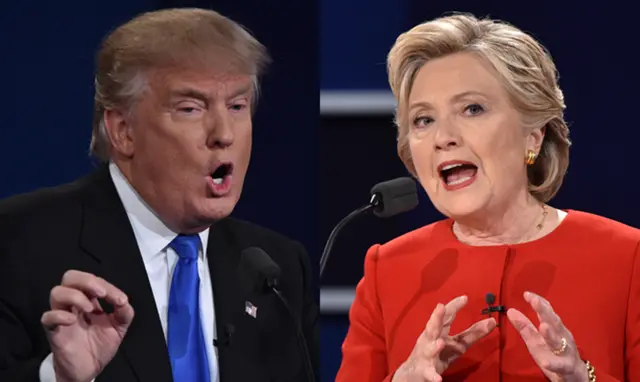The U.S. presidential campaign neared its end on Monday in the same angry tone it began, with Republican Donald Trump calling Democrat Hillary Clinton a "phony" and Clinton accusing him of splitting the country, as a new Reuters/Ipsos opinion poll showed Clinton with a strong chance of winning.
Clinton and Trump raced through several battleground states in a last-ditch attempt to encourage their supporters to show up and vote on Tuesday.
Clinton sought to capture more support from Latinos, African-Americans and young people, while Trump looked to win over disaffected Democrats and rev up a middle class that he said has been sidelined by the political establishment.
The Reuters/Ipsos States of the Nation project gave Clinton a 90 percent chance of defeating Trump, seeing her on track to win 303 Electoral College votes out of the 270 needed, to Trump's 235.
With surveys indicating a tight race in Michigan, which Democrats have long counted on winning, both candidates made campaign appearances there. Pennsylvania, another vote-rich state, was also seen as fertile ground by both camps in the closing hours of their campaigns.
People line up to vote early outside the San Diego County Elections Office in San Diego, California, U.S., November 7, 2016.REUTERS/Mike Blake
Clinton held the biggest rally of her campaign in Philadelphia on Monday night, drawing a crowd that the city's Fire Department put at 33,000 to hear her and President Barack Obama, first lady Michelle Obama and rockers Bruce Springsteen and Jon Bon Jovi.
"Tomorrow we face the test of our time," Clinton told supporters, saying they could decide what sort of country they wanted to live in. "We choose to believe in a hopeful, inclusive, big-hearted America."
Obama, who campaigned earlier in the day for Clinton in Ann Arbor, Michigan, reiterated his charge that Trump is "temperamentally unfit to be commander in chief,” and said Clinton offered an experienced and accomplished alternative.
"You don't just have to vote against someone, you have someone extraordinary to vote for," Obama said. "She will work and she will deliver, she won't just tweet."
Republican presidential nominee Donald Trump speaks during a campaign rally in Raleigh, North Carolina, U.S. November 7, 2016. REUTERS/Carlo Allegri
Trump told voters at an evening rally in Manchester, New Hampshire, they had one question facing them at the ballot box on Tuesday.
"Do you want America to be ruled by the corrupt political class or do you want America to be ruled again by the people?" he asked. "Tomorrow the American working class will strike back."
With only hours left before Election Day, the Clinton campaign was boosted by Sunday's unexpected announcement by FBI Director James Comey that the agency stood by its July decision not to press any criminal charges in an investigation of Clinton's email practices while she was secretary of state.
The latest opinion polls measuring popular support for each candidate showed Clinton narrowly ahead. She had a 5 percentage point lead over Trump nationally, with 44 percent to 39 percent support, according to latest Reuters/Ipsos poll.
Races in the hotly contested states of Florida and North Carolina were shifting, however, from favouring Clinton to being too close to call.
U.S. Democratic presidential nominee Hillary Clinton speaks in front of Gold Star Father Khizr Khan at a campaign rally in Manchester, New Hampshire, U.S., November 6, 2016.REUTERS/Lucas Jackson
Clinton, who is trying to become the first woman elected to the White House, had a 4 percentage point lead over Trump in separate polls by Fox News and CBS News released on Monday.
Financial markets brightened on the latest twists in what has been a volatile presidential campaign. Global stock markets surged, as did the U.S. dollar, putting them on track for their biggest gains in weeks, as investors saw Sunday's announcement by Comey as boosting Clinton's chances of winning.
Clinton's comfortable lead had eroded since late last month and investors had been unnerved by the tightening race. Clinton is considered a known quantity, while Trump is considered a political wild card.
Victory is ultimately determined not by the popular vote, but by capturing a majority of the votes in the Electoral College, which awards votes on a state-by-state basis, meaning that a handful of states where the race is close assume an outsized importance.
(REUTERS)
 简体中文
简体中文

